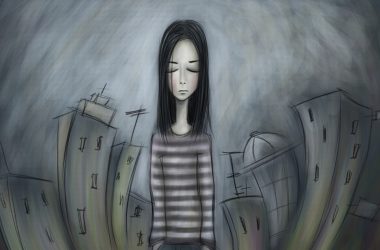“I exist/ sans the biology of man and woman or the plateau of/ culture, my feet drag to no city, transcending mad dogs/ that bark quietly, as I happen to touch the unwinding of/ gears in clocks, the feeling of unfeeling in emotion,” writes Meghna Prakash, an Indian queer poet and mental health activist in her poem “The Pain The Pain The Pain.” It is part of her debut poetry collection titled Trigger Warning: Poems of Love and Resistance (2020) published by Hawakal Publishers.
Dedicated to her grandmother who read poetry to her as a child, this book is also an offering for people seeking ways to speak about abuse, pain, survival and healing. She adopts the confessional mode of writing, a poetic style wherein the poet draws on autobiographical material to talk about deeply personal life experiences — often involving trauma, violence, psychological distress, and self-harm.
In another poem called “Trigger Warning,” she writes, “you are with your new lover for/ one minute/ but your kiss is the ex frenching you/ without consent/ I want to say I am strong,/ I make art of the trauma that refuses/ to leave my body or memory/ but he keeps stabbing,/ as I am running in a field of blue/ orchards, the sky has dropped/ on my chest, this freedom is a trap.”
Though confessional poetry is unfairly dismissed as self-indulgent, especially when it is written by women, it has the capacity to reveal how a poet’s personal life is shaped by social and political factors. Trigger Warning: Poems of Love and Resistance is not only an attempt to process childhood abuse, violent relationships and mental health issues; in doing so, the poet also exposes the potential for danger and damage in intimate relationships, spaces of care, and the institution of family — all of which are usually considered safe.
She seeks fellowship in the words of three other poets whose words appear as epigraphs at the beginning of this book — poet-activist Andrea Gibson who writes about the struggles faced by LGBTQ people in the United States, poet-screenwriter Fatimah Asghar who writes about orphanhood and the legacy of Partition in South Asia, and poet-novelist-translator Meena Kandasamy who writes about caste annihilation and feminism. The book’s cover art is by poet-artist Priyanka Paul, a prominent public voice in support of Dalit rights and trans rights.
Here are some excerpts from an interview with Meghna Prakash.
Chintan Girish Modi: What does it feel like to have your poems come together in the form of a book rather than sit alone as separate pieces of work?
It has been a dream of mine to be a published poet since I was 16 years old. It took me a while to get here but my poems document my narrative as a queer brown woman in the context of my battles as a survivor. It is an introspective experience. On difficult and occasionally happy days, I end up processing traumatic or difficult events that I would otherwise struggle to navigate through.
I have had my poems published independently in journals before but seeing them together as a collection feels like a portal back in time into the most intimate details of my life. I have grappled with my self-confidence and imposter syndrome, so it is a constant struggle thinking whether my work is worth publishing in fact and subsequently worth promoting and sharing with the world.
It was very emotional for me when I first held my book. I really could not believe all of this was happening. I am grateful to Kiriti Sengupta da for having faith in my work, and publishing it without too many edits or changes to the natural order and form of my poems.
Chintan Girish Modi: How did you zero in on the title Trigger Warning? On the one hand, you want to talk openly about mental health because there is stigma around it. On the other hand, you also want readers to proceed with caution.
It has been important for me to approach mental health — universally, as well as my own mental health experiences — from a place of empathy. Mental health in India has a lot of work cut out for the next decade. Conversations are opening up but there is still very little policy framework in place and employment aid available for those with mental health issues to use as external support.
I have borderline personality disorder, c-PTSD, bipolar and ADHD. I do my best to create awareness through my poetry about what I have learnt about these mental health disorders. Since there is a lot changing in the field of psychology, I can only speak from my position as someone with these conditions and as a poet. I needed to let my readers know that my book is another way to initiate a safe space to have more conversations around mental health, violence, and sexual trauma.
At the same time, they must read the poems only at a time when their mental health allows for it, and be prepared to read about intimate moments and struggles which may bring them to terms with some of their own. That is how I define my relationship with poetry. A lot of it is me coming to terms with my trauma and the worldview I project when I see the world around me passing by.
Chintan Girish Modi: The shortest poem in this book states: “water lilies/ need to bloom/ in a cold dark room.” It is a stunning image, both in the literal sense and as a metaphor. These three lines capture the essence of the entire book for me. What do they mean to you?
This haiku captures my essence in a fragment. There is fleeting hope that I hold on to, and I need to believe I am growing with my experiences and finding myself a community of other survivors who inspire me to find healthier ways of coping with my trauma. For me, I place a lot of importance on normalising conversations around violence and I want to create safe spaces where people like myself can find support and have dialogues around these intimate, misunderstood, and often misrepresented subjects.
Chintan Girish Modi: Conversations about child sexual abuse, intimate partner violence, depression and trauma are quite difficult to have even though we now have ‘safe spaces’ to make these possible. When and how can poetry in itself become a ‘safe space’?
For me, I create my own safe space within the folds of my poems. It took me many years of healing and therapy to move forward from victim mode to that of a survivor coming to terms with violent experiences that have deeply influenced my worldview. My poems have often encouraged me not to give up on myself. I write about that which nobody has ever said to me, and I needed to hear. It’s things I’ve been afraid to admit to myself but are instrumental in my healing and mental well-being. It’s difficult conversations you have with family members that you wished you’d forget because it is not part of your nature to be confrontational, but you write about it so the conversation doesn’t end in the family home.
Poetry will be a safe space when the community works together as a collaborative, with older poets mentoring younger ones, having open conversations about publishing opportunities and maintaining safe spaces for poets to meet and perform/review/analyse their poems. I started a small initiative called Poetry Dialogue in a humble attempt to share as much poetry as I discover daily with the poetry community free of cost along with publishing opportunities I come across. I am always inspired and awed by the powerful, new voices I come across as I curate these poems. I have a wonderful team that supports my vision and often takes charge of periodic workshops and digital activities to further promote conversations around poetry.
I also adore other organizations that compassionately promote poetry in genuinely safe spaces. Specifically, I love The Alipore Post and the Airplane Poetry Movement from India for doing wonderful and impact-driven work to educate and initiate poetry into the daily lives of so many people.
Chintan Girish Modi: Who are the poets you read when you seek validation, resonance or healing?
I have been inspired by poets I’ve met personally and admire deeply. I prefer the poems of poets in my immediate environment, who write about issues I care about. I read global poets too but my peers have supported and collaborated with me to help me grow consistently as a poet — Anesce Dremen, Nandini Varma, Rohini Kejriwal, Manjiri Indurkar, Avinab Datta-Areng, Aakriti Kuntal, Priyanka Paul, Megha Rao, Mariyam Saigal, Daniel Sukumaran, Angsuman Sarma, and I can go on with this list for a long time. They are very fresh young contemporary voices from India (except Anesce who is an American Fulbright Scholar in India). K. Srilata Ma’am, Paresh Tiwari and Sivakami Velliangiri Ma’am have guided me in this journey, and I am grateful for their encouragement, insights and review of my work.
Chintan Girish Modi: What do you hope for readers to take back from your book?
I have put my whole heart in my work, and I have now let go of this book. I try not being closely affected or influenced by the reviews the book receives. I am still building confidence in the value of my work, so I am experimenting with my writing and poetry sensibilities as much as I can. Let the readers take away what they wish.
******
Here is a set of three short poems from Meghna Prakash’s book Trigger Warning: Poems of Love and Resistance (2020), published by Hawakal Publishers. They have been reproduced here with the poet’s permission.
A LOVE MEDLEY
The plants are wiltingin a fresh cup of waterSometimes, they diewhen you care too much,pouring more lovethan asked for.Is it why we died
when we were to bloom?



